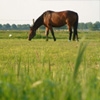|
Advice article filter
|
Research into the quality of roughageFifty percent of roughage is of bad quality You would like to give your horse a tasty and healthy snack. During the winter months of 2007/2008 it was difficult to find good quality roughage. What can we do about this? What is the actual quality of the roughage we feed our horses? Pavo asked the BLGG laboratory in Oosterbeek (NL) to investigate the roughage currently available on the market. Inconsistent The main characteristic of 2007 was the dry and early spring. April was warm and dry, followed by three wet months. This weather was responsible for a big inconsistency in the quality of hay and haylage. The result was a significant price increase for hard feed and straw. Horse owners did feel the pinch and looked for possibilities to save some money. In principle you can give your horse less hard feed, but only in combination with excellent roughage. And that is exactly where the problem lies, because, is the quality of roughage that good? Measurements During December 2007 roughage samples have been collected from over 100 stable yards. The BLGG has thoroughly investigated those samples. The investigations showed the following results:
Also the minerals were looked at:
Concluding.... The investigations show that the quality of more than half of the samples was doubtful to very bad. That means the roughage contains less protein and energy than we expected. That does not have to be a problem, as long as you know it and you do something about it. That is why it is very important to check your roughage at regular intervals. Only when you know what the contents are, are you able to tune your hard feed in relation to your roughage. That way you can compose a balanced diet for your horse. 
|

